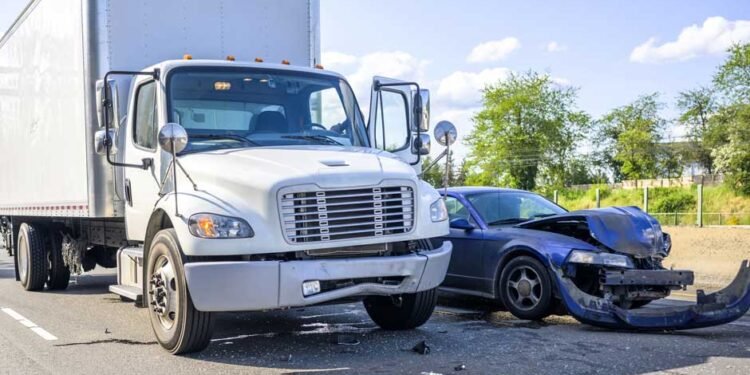Commercial truck accidents are an unfortunate reality on roads and highways across the world. Due to the sheer size and weight of these vehicles, accidents involving trucks often result in severe injuries or fatalities, not only for the truck drivers but also for occupants of smaller vehicles.
Driver Fatigue
Driver fatigue is one of the leading causes of commercial truck accidents. Truck drivers are often required to work long hours and cover great distances, sometimes with insufficient breaks. This can lead to physical and mental exhaustion, which severely impairs a driver’s reaction times, judgment, and overall ability to drive safely.
The Federal Hours-of-Service regulations were created to prevent fatigue-related accidents by limiting the number of hours a driver can be on the road. These regulations require drivers to take rest breaks and limit driving to a maximum of 11 hours per day with at least 10 consecutive hours off-duty between shifts. Despite these regulations, some drivers and companies may push the limits to meet tight deadlines, putting themselves and others at risk.
Accidents caused by driver fatigue are particularly dangerous because a tired driver may not be alert enough to respond to changing traffic conditions or emergencies.
Distracted Driving
A Vancouver truck accident lawyer explained that distracted driving is another major factor in commercial truck accidents. With long hours behind the wheel, truck drivers can be tempted to engage in distractions such as using mobile phones, eating, adjusting the radio, or even interacting with on-board technology. Taking their eyes off the road, even for a few seconds, can have catastrophic results, especially given the size and speed of commercial trucks.
To mitigate this risk, many trucking companies have implemented policies that restrict the use of mobile devices while driving. Hands-free technology and voice-activated controls are also being promoted to help reduce distractions.
Improper Maintenance and Equipment Failure
A commercial truck requires regular maintenance to operate safely. When essential components such as brakes, tires, or lights fail, the consequences can be deadly. Improper maintenance and equipment failure are common causes of truck accidents, often due to the pressure on trucking companies to keep vehicles on the road and minimize downtime.
Key areas of concern include:
- Brakes: Worn or faulty brakes can make it impossible for a truck to stop in time, especially in emergencies.
- Tires: Overused or underinflated tires can lead to blowouts, loss of control, or rollovers.
- Lights: Broken or faulty lights reduce visibility, increasing the risk of collisions, especially at night.
The Federal Motor Carrier Safety Administration (FMCSA) has regulations that require commercial trucks to undergo regular inspections and maintenance. However, not all companies follow these regulations diligently. If a truck accident occurs due to a lack of maintenance, both the driver and the trucking company could be held legally liable.
Speeding and Reckless Driving
Speeding is a dangerous behavior for any driver, but it is especially perilous for commercial truck drivers. Due to the size and weight of these vehicles, speeding significantly reduces a truck’s ability to stop quickly and increases the risk of losing control, especially on curves or in hazardous conditions.
Reckless driving, including tailgating, unsafe lane changes, and aggressive behavior on the road, also contributes to commercial truck accidents. Speeding and reckless driving are often exacerbated by time pressures, as drivers may feel compelled to meet delivery deadlines.
Driving a commercial truck at excessive speeds in bad weather or on poorly maintained roads can be particularly hazardous. Reducing speed in adverse conditions is essential to maintaining control and ensuring the safety of everyone on the road.
Overloading and Improper Cargo Securement
Commercial trucks are often required to transport heavy cargo, but there are strict regulations in place to prevent overloading. When trucks exceed their weight limits, they become more difficult to handle, increasing the likelihood of accidents. Overloaded trucks are prone to rollovers, and excessive weight can cause braking systems to fail.
In addition to overloading, improper cargo securement is another frequent cause of truck accidents. If cargo is not properly tied down, it can shift during transit, causing the truck to become unbalanced. This may lead to jackknifing, where the trailer swings out from behind the truck, or even cause the cargo to fall off the truck and create hazards for other vehicles.
Adverse Weather Conditions
Adverse weather conditions such as rain, snow, fog, and wind have a significant impact on the safety of commercial trucks. Wet or icy roads reduce tire traction, making it difficult for trucks to stop or change direction. High winds can cause trucks to sway or lose stability, especially for vehicles with large trailers.
Truck drivers need to exercise extreme caution when driving in poor weather. Reducing speed, increasing following distance, and using chains on tires in snowy conditions are some of the best practices for maintaining control. However, not all drivers adjust their behavior accordingly, which can lead to preventable accidents.
Inexperienced or Poorly Trained Drivers
Driving a commercial truck requires specialized skills, and new or inexperienced drivers may lack the expertise needed to handle these vehicles in challenging situations. Poorly trained drivers are more likely to make critical errors, such as misjudging stopping distances, failing to navigate turns properly, or not knowing how to react in emergency situations.
To operate a commercial truck, drivers must obtain a Commercial Driver’s License (CDL) and undergo extensive training. However, some trucking companies may cut corners in their training programs, leading to drivers being ill-prepared for the demands of the job. Comprehensive training programs can reduce the risk of accidents by ensuring that drivers have the necessary skills to operate their vehicles safely.












